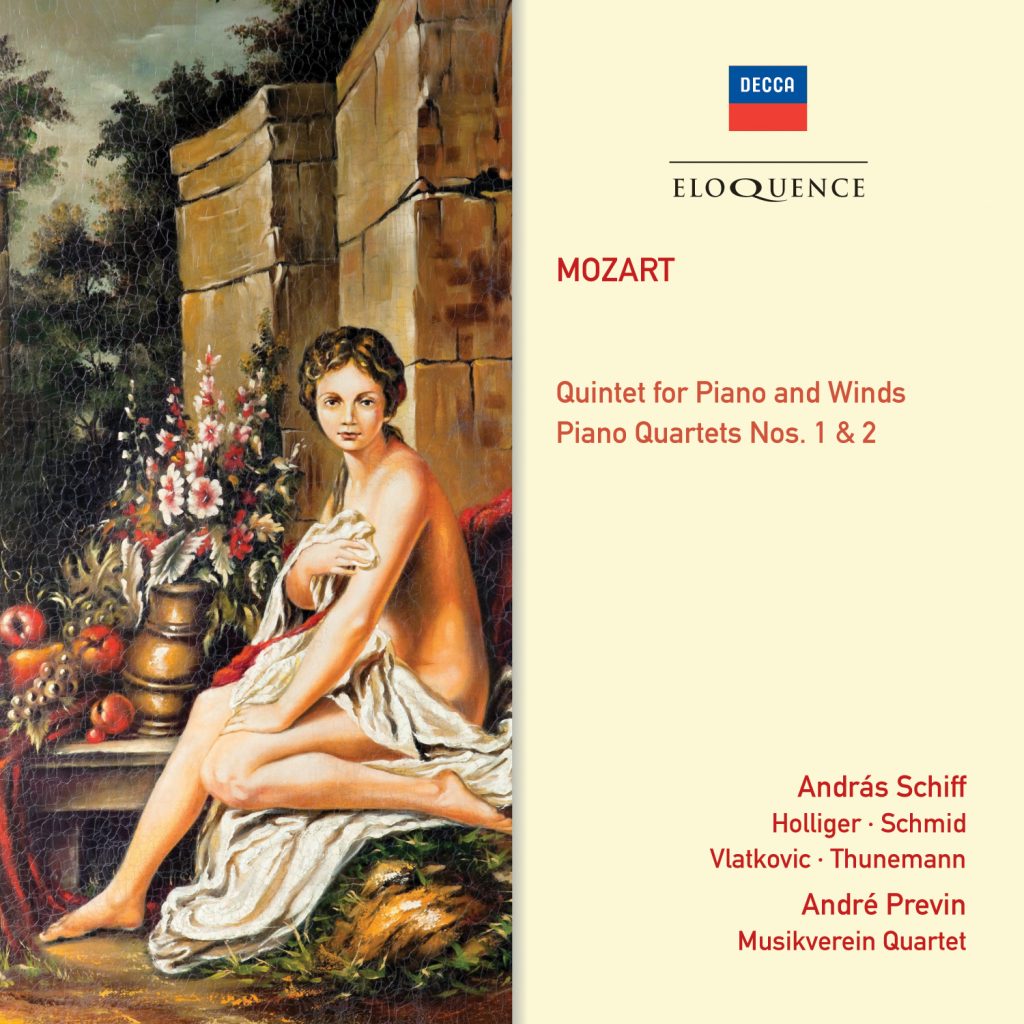The Piano Quartets are like heavenly twins, alike on the outside but very different in tone. The G minor, like all Mozart’s works in that key, is intense, introspective and even tragic in places. The E flat is extrovert, bracing, brilliant and straightforwardly pleasurable. The present performances feature what, at first glance, is a strange match between a pianist who made his name in Hollywood and members of a quartet drawn from the archetypal central European orchestra, the Vienna Philharmonic. But there was always more to André Previn than his connection with the movies implied. Born in Berlin in 1929, he already had studies in his home city and Paris behind him when he emigrated to America with his family in 1939; and it was as a brilliant prodigy that he went to Hollywood in his late teens. His work in films gave him an all-round grounding in practical musicianship and he was always a sought-after pianist in both jazz and classical circles.
The quintet in E flat, KV 452, could hardly be more different from the piano quartets. For one thing, it involves Mozart’s four favourite wind instruments, oboe, clarinet, horn and bassoon – he affected not to like the flute, although he wrote well enough for it. And even though a piano is involved, Mozart’s instincts for the qualities of individual instruments tell him that he has to let the winds express their idiosyncratic characters, sometimes keeping the piano out of their way. All four winds have their distinctive solos and, where possible, Mozart combines them in differing combinations against the piano. It can be a difficult work to balance but the problem is triumphantly surmounted in this recording, made in the Mozartsaal of the Konzerthaus in Vienna, where the Busch, Konzerthaus and Alban Berg Quartets used to hold sway. The sessions were overseen by the legendary Decca producer, Christopher Raeburn, a Mozartian to his fingertips. The great Hungarian pianist, András Schiff (born 1953), was joined by four illustrious wind soloists: Swiss oboist and composer, Heinz Holliger (born 1939); his compatriot clarinettist Elmar Schmid (born 1947); Croatian horn player, Radovan Vlatkovic (born 1962); and German bassoonist, Klaus Thünemann (born 1937).
WOLFGANG AMADEUS MOZART
Quintet for Piano, Oboe, Clarinet, Horn & Bassoon in E flat major, KV 452
András Schiff, piano
Heinz Holliger, oboe
Elmar Schmid, clarinet
Radovan Vlatkovic, bassoon
Klaus Thunemann, horn
Piano Quartet No. 1 in G minor, KV 478
Piano Quartet No. 2 in E flat major, KV 493
André Previn, piano
Musikverein Quartet
Rainer Küchl, violin
Peter Götzel, viola
Franz Bartolomey, cello
Recording producers: Christopher Raeburn (KV 452); James Walker (KV 478, KV 493)
Recording engineers: Simon Eadon (KV 452); John Dunkerley (KV 478, KV 493)
Recording location: Kingsway Hall, London, UK, 7–9 January 1981 (KV 478, KV 493); Mozart Saal, Konzethaus, Vienna, Austria, 3 April 1994 (KV 452)
‘I have nothing but praise for the Decca recording and the way it achieves a just and highly satisfactory balance between the piano and the strings’ (Piano Quartets) Gramophone
‘On the surface (and only on the surface) these performances are similar to the slick, cool readings recorded by George Szell and members of the Budapest Quartet. André Previn may not yet be in Szell’s league as a conductor, but here he proves himself an equally stylish and considerably more sensitive pianist. Previn’s tone is purer and more finely controlled, and he is a much more intelligent ensemble player, knowing (as Szell seemed not to) how to blend with his colleagues and step out of the spotlight when the music so demands. … These are exemplary readings, and the string players acquit themselves admirably … Rich, close sound and flawless surfaces contribute to making this a most welcome release’ (Piano Quartets) Fanfare
‘The wind players are excellent and blend well, while the overall ensemble displays a fine unity. The balance places the piano more backwardly than usual, but no detail of Schiff’s playing is lost.’ (Quintet) Gramophone

